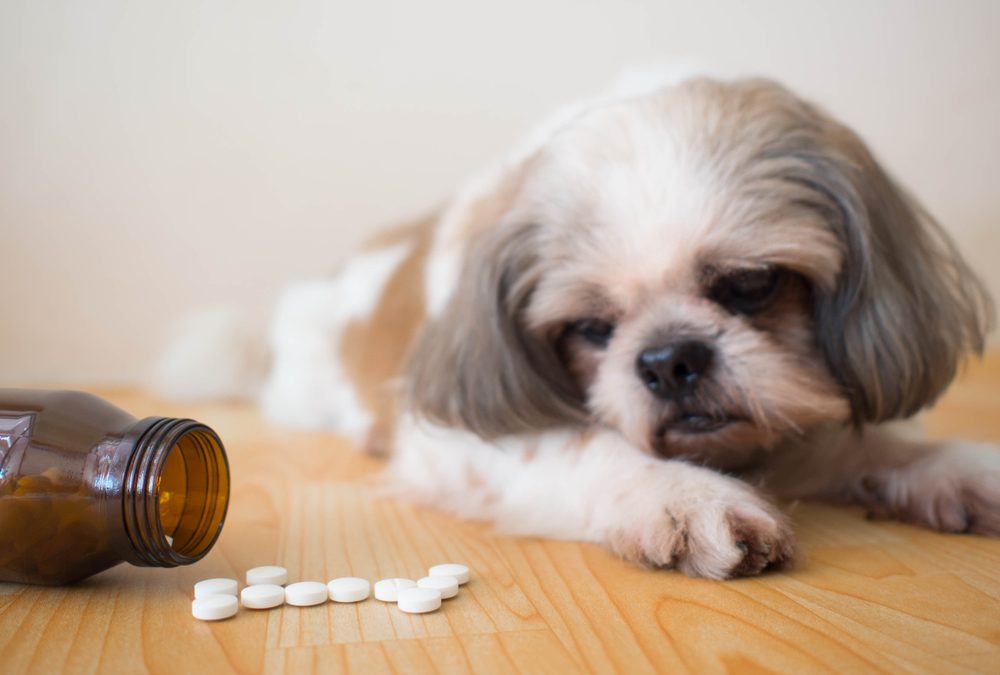Human medication toxicity, whether intentional or accidental, is a common occurrence in pets. Learn about some of the most common human medications that can harm your pet and how you can protect them from being poisoned.
Common human medications that are dangerous for pets
Any medication has the potential to be dangerous, but some human medication toxicities that occur most frequently in pets include:
- Nonsteroidal anti-inflammatory drugs (NSAIDs) — Ibuprofen, naproxen, and aspirin can be dangerous for pets and can cause stomach ulcers, kidney failure, and liver damage.
- Acetaminophen — Acetaminophen is especially toxic to cats, but can also cause health issues in dogs. Toxicity can result in liver damage and red blood cell destruction, and vomiting, lethargy, and difficulty breathing.
- Antidepressants — Some antidepressants, such as selective serotonin reuptake inhibitors (SSRIs), can cause serotonin syndrome, leading to agitation, tremors, an elevated heart rate, and seizures.
- Sleep aids — Sleep aids can severely sedate pets and cause other adverse reactions, including respiratory depression.
- ADHD medications — These medications can cause elevated heart rate, agitation, tremors, seizures, and other serious problems in pets.
- Cold and flu medications — Many of these contain ingredients, such as pseudoephedrine or acetaminophen, that can be toxic to pets.
- Prescription pain medications — Opioids like oxycodone, morphine, and others can cause respiratory depression, sedation, and other serious effects in pets.
- Muscle relaxants — Medications like baclofen and cyclobenzaprine can cause severe sedation and lethargy in pets.
- Birth control pills — Pets who ingest estrogen-containing medications can suffer bone marrow suppression and other serious health issues.
The dangers of sharing vitamins with your pet
While vitamins and minerals are essential for people and pets, the dosages and specific nutrient needs can vary greatly between species. For example, excessive amounts of certain fat-soluble vitamins like vitamin A can be toxic for pets. This means that vitamins formulated for people can be dangerous for your pet, or that vitamins labeled for use in dogs may not be ideal for cats.
Ideally, your pet’s diet is well-balanced and provides the appropriate proportions of vitamins and minerals. However, if you are concerned about your pet’s nutrition, make an appointment to discuss diet and supplement options with our team.
How to prevent human medication toxicity in your pet

Human medication toxicity can be fatal in your pet, so take every precaution to keep them safe, including:
- Storing medications safely — Keep all human medications, including over-the-counter (OTC) and prescription drugs, securely stored in cabinets or containers that your pet cannot access, and close containers tightly after each use.
- Disposing of medications properly — Dispose of expired or unused medications safely—do not simply throw them in the trash where your pet could easily find them. Many communities offer medication disposal programs or take-back events.
- Exercising caution when giving medication — Never give your pet any medication intended for human use without specific instructions from your veterinarian. Seemingly harmless medications can be toxic to pets in the wrong dosage or formulation.
- Recognizing toxicity signs — Familiarize yourself with pets’ medication toxicity signs, such as vomiting, diarrhea, lethargy, difficulty breathing, tremors, seizures, and collapse. If you suspect your pet has ingested a toxic substance, immediately contact your veterinarian or an emergency veterinary clinic.
- Storing emergency contacts — Keep the phone numbers for our veterinarian, a local emergency veterinary hospital, and an animal poison control hotline readily available in case of an emergency.
The number one way to prevent human drug toxicity in your pet—always consult with your veterinarian at The Old 41 Animal Hospital before you administer any medication that has not been prescribed for your specific pet. However, if your pet does manage to get their paws on the wrong pills, call our team for help.

